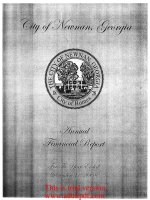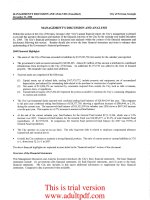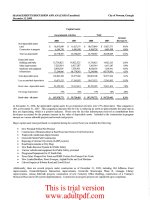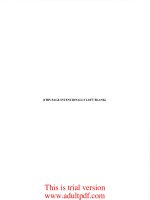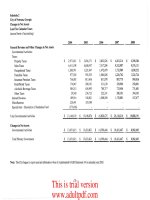HUGHES SPRINGS INDEPENDENT SCHOOL DISTRICT ANNUAL FINANCIAL REPORT FOR THE YEAR ENDED AUGUST 31, 2009_part3 doc
Bạn đang xem bản rút gọn của tài liệu. Xem và tải ngay bản đầy đủ của tài liệu tại đây (222.52 KB, 11 trang )
EXHIBIT D-1
HUGHES SPRINGS INDEPENDENT SCHOOL DISTRICT
STATEMENT OF NET ASSETS
PROPRIETARY FUNDS
AUGUST 31, 2009
Internal
Service Fund
Governmental
Activities -
ASSETS
Current Assets:
5,459
Cash and Cash Equivalents
$
Total Assets
5,459
LIABILITIES
Current Liabilities:
5,459
Due to Other Funds
Total Liabilities
5,459
20
The notes to the financial statements are an integral part of this statement.
This is trial version
www.adultpdf.com
EXHIBIT D-2
HUGHES SPRINGS INDEPENDENT SCHOOL DISTRICT
STATEMENT OF REVENUES, EXPENSES, AND CHANGES IN FUND NET ASSETS
PROPRIETARY FUNDS
FOR THE YEAR ENDED AUGUST 31, 2009
Internal
Service Fund
Governmental
Activities -
OPERATING REVENUES:
10,600
Local and Intermediate Sources
$
Total Operating Revenues
10,600
OPERATING EXPENSES:
10,600
Payroll Costs
Total Operating Expenses
10,600
21
The notes to the financial statements are an integral part of this statement.
This is trial version
www.adultpdf.com
EXHIBIT D-3
HUGHES SPRINGS INDEPENDENT SCHOOL DISTRICT
STATEMENT OF CASH FLOWS
FOR THE YEAR ENDED AUGUST 31, 2009
PROPRIETARY FUNDS
Internal
Service Fund
Governmental
Activities -
Net Decrease in Cash and Cash Equivalents
(430)
Cash and Cash Equivalents at Beginning of the Year: 5,889
Cash and Cash Equivalents at the End of the Year: 5,459
$
Operating Income (Loss):
$
Reconciliation of Operating Income (Loss) to Net Cash
Used for Operating Activities:
-
Assets and Liabilities:
Effect of Increases and Decreases in Current
(430)
Increase (decrease) in Due To Other Funds
Net Cash Used for Operating
Activities
(430)$
22
The notes to the financial statements are an integral part of this statement.
This is trial version
www.adultpdf.com
EXHIBIT E-1
HUGHES SPRINGS INDEPENDENT SCHOOL DISTRICT
STATEMENT OF FIDUCIARY NET ASSETS
FIDUCIARY FUNDS
AUGUST 31, 2009
Agency
Funds
ASSETS
44,501
Cash and Cash Equivalents
$
Total Assets
44,501
LIABILITIES
44,501
Due to Student Groups
$
Total Liabilities
44,501
23
The notes to the financial statements are an integral part of this statement.
This is trial version
www.adultpdf.com
HUGHES SPRINGS INDEPENDENT SCHOOL DISTRICT
NOTES TO THE FINANCIAL STATEMENTS
FOR THE YEAR ENDED AUGUST 31, 2009
NOTE I. SUMMARY OF SIGNIFICANT ACCOUNTING POLICIES
The Hughes Springs Independent School District (the "District") is a public education agency operating
under the applicable laws and regulations of the state of Texas. It is governed by a seven member Board
of Trustees (the “Board”) elected by registered voters of the District. The District prepares its financial
statements in conformity with generally accepted accounting principles promulgated by Governmental
Accounting Standards Board and other authoritative sources identified in Statements on Auditing
Standards No. 69 of the American Institute of Public Accountants and it complies with the
requirements of the appropriate version of Texas Education Agency's Financial Accountability System
Resource Guide (the “Resource Guide”) and the requirements of contracts and grants of agencies from
which it receives funds.
A. REPORTING ENTITY
The Board of Trustees (the “Board”) is elected by the public and it has the authority to make decisions,
appoint administrators and managers, and significantly influence operations. It also has the primary
accountability for fiscal matters. Therefore, the District is a financial reporting entity as defined by the
Governmental Accounting Standards Board (“GASB”) in its Statement No. 14, “The Financial
Reporting Entity.” There are no component units included within the reporting unit.
B. GOVERNMENT-WIDE AND FUND FINANCIAL STATEMENTS
The Statement of Net Assets and the Statement of Activities are government-wide financial statements.
They report information on all of the Hughes Springs Independent School District’s nonfiduciary
activities with most of the interfund activities removed. Governmental activities include programs
supported primarily by taxes, State foundation funds, grants and other intergovernmental revenues.
The Statement of Activities demonstrates how other people or entities that participate in programs the
District operates have shared in the payment of the direct costs. The "charges for services" column
includes payments made by parties that purchase, use, or directly benefit from goods or services
provided by a given function or segment of the District. Examples include tuition paid by students not
residing in the district, school lunch charges, etc. The "grants and contributions" column includes
amounts paid by organizations outside the District to help meet the operational or capital requirements
of a given function. Examples include grants under the Elementary and Secondary Education Act. If a
revenue is not a program revenue, it is a general revenue used to support all of the District's functions.
Taxes are always general revenues.
The District reports all direct expenses by function in the Statement of Activities. Direct expenses are
those clearly identifiable with a function. Depreciation expense is specifically identified by function and
is included in the direct expense to each function.
Interfund activities between governmental funds appear as due to/due from on the Governmental Fund
Balance Sheet and as other resources and other uses on the governmental fund Statement of Revenues,
Expenditures and Changes in Fund Balance. All interfund transactions between governmental funds and
internal service funds are eliminated on the government-wide statements. Interfund activities between
governmental funds and fiduciary funds remain as due to/due from on the government-wide Statement
of Activities.
The fund financial statements provide reports on the financial condition and results of operations for
three fund categories - governmental, proprietary, and fiduciary. Since the resources in the fiduciary
funds cannot be used for District operations, they are not included in the government-wide statements.
The District considers some governmental funds major and reports their financial condition and results
of operations in a separate column.
24
This is trial version
www.adultpdf.com
HUGHES SPRINGS INDEPENDENT SCHOOL DISTRICT
NOTES TO THE FINANCIAL STATEMENTS
FOR THE YEAR ENDED AUGUST 31, 2009
C. MEASUREMENT FOCUS, BASIS OF ACCOUNTING, AND FINANCIAL STATEMENT
PRESENTATION
Government-wide Financial Statements The government-wide financial statements use the economic
resources measurement focus and the accrual basis of accounting, as do fiduciary fund financial
statements. Revenues are recorded when earned and expenses are recorded when a liability is incurred,
regardless of the timing of the related cash flows. Property taxes are recognized as revenues in the year
for which they are levied. Grants and similar items are recognized as revenue as soon as all eligibility
requirements imposed by the provider have been met.
Fund Financial Statements
Governmental fund financial statements use the current financial
resources measurement focus and the modified accrual accounting. With this measurement focus, only
current assets, current liabilities and fund balances are included on the balance sheet. Operating
statements of these funds present increases (revenues and other financing sources) and decreases
(expenditures and other financing uses) in net current assets.
The modified accrual basis of accounting recognizes revenues in the accounting period in which they
become both measurable and available. For this purpose, the District considers revenue available if they
are collected within 60 days of the end of the current fiscal period. It recognizes expenditures in the
accounting period in which the fund liability is incurred, if measurable, except for unmatured interest on
General Long-Term Debt, which is recognized when due. The expenditures related to certain
compensated absences and claims and judgments are recognized when the obligations are expected to
be liquidated with expendable available financial resources.
Revenues from local sources consist primarily of property taxes. Property tax revenues and revenues
received from the State are recognized under the susceptible-to-accrual concept. Miscellaneous
revenues are recorded as revenue when received in cash because they are generally not measurable until
actually received. Investment earnings are recorded as earned, since they are both measurable and
available.
Grant funds are considered to be earned to the extent of expenditures made under the provisions of the
grant. Accordingly, when such funds are received, they are recorded as deferred revenues until related
and authorized expenditures have been made. If balances have not been expended by the end of the
project period, grantors sometimes require the District to refund all or part of the unused amount.
D. FUND ACCOUNTING
The District reports its financial activities through the use of “fund accounting.” The activities of the
District are organized on the basis of funds. The operations of each fund are accounted for within a
separated set of self-balancing accounts to reflect results of activities. Fund accounts segregates funds
according to their intended purpose and are used to assist management in demonstrating compliance
with finance-related legal and contractual provisions. As required by the Texas Education Agency, the
following fund types are included in the financial statements.
Governmental Funds
The District reports the following major governmental funds:
1. The General Fund – The general fund is the District's primary operating fund. It accounts for all
financial resources except those required to be accounted for in another fund.
25
This is trial version
www.adultpdf.com
HUGHES SPRINGS INDEPENDENT SCHOOL DISTRICT
NOTES TO THE FINANCIAL STATEMENTS
FOR THE YEAR ENDED AUGUST 31, 2009
Additionally, the District reports the following fund type(s):
Governmental Funds:
1. Special Revenue Funds – The District accounts for resources restricted to, or designated for,
specific purposes by the District or a grantor in special revenue fund. Most Federal and some State
financial assistance is accounted for in a Special Revenue Fund, and sometimes unused balances
must be returned to the grantor at the close of specified project periods.
2. Internal Service Funds – Revenues and expenses related to services provided to organizations
inside the District on a cost reimbursement basis are accounted for in an internal service fund.
The District's Internal Service Fund is Worker’s Compensation Self-funded Insurance.
3. Debt Service Fund – The District accounts for resources accumulated and payments made for
principal and interest on long-term general obligation debt of governmental funds in a debt service
fund.
Fiduciary Funds:
1. Agency Funds – The District accounts for resources held for others in a custodial capacity in
agency funds. The District's Agency Fund is the Student Activity Fund.
E. ASSETS, LIABILITIES,AND NET ASSETS OR EQUITY
1. Cash and Cash Equivalent
The District’s Cash Management and Investment Policy requires all deposits to be fully
collateralized with depository insurance; obligations of the United States of America or its agencies
and instrumentalities (excluding those mortgaged backed securities prohibited by the Public Funds
Investments Act); public fund investment pools; or in any manner and amount provided by law for
deposits of the District. At all times, such securities are to have a fair value of not less than 110
percent of the amount of the deposits collateralized, adjusted by at amount of applicable depository
insurance.
The District considers highly liquid investments to be cash equivalents if they have maturity of
three months or less when purchased. All other monetary assets are treated as investments including
certificate of deposit, investment pools, money market investments, and other securities defined
under the Public Funds Investment Act.
2. Investments
Investments are stated at fair value, which is the amount at which the investment can be exchanged
in a current transaction between willing parties. Management of the District believes that in the
areas of investment practice, management reports, and establishment of appropriate policies, the
District adhered to the requirements of the State of Texas Public Funds Investment Act.
Additionally, management of the District believes that investment practices of the District were in
accordance with local policies.
3. Receivables and Payables
All trade and property tax receivables are shown at face value. The property tax receivable
allowance is shown at 6.00 percent of outstanding property tax at August 31, 2009.
26
This is trial version
www.adultpdf.com
HUGHES SPRINGS INDEPENDENT SCHOOL DISTRICT
NOTES TO THE FINANCIAL STATEMENTS
FOR THE YEAR ENDED AUGUST 31, 2009
4. Inventories
Inventories of supplies on the balance sheet are valued at first in/first out (FIFO) method and
include consumable maintenance, instructional, and office items. Supplies are recorded as
expenditures when they are purchased. If any supplies are on hand at the end of the year, their total
cost is recorded as inventory and the fund balance is reserved for the same amount.
5. Grant Fund Accounting
The Special revenue Fund includes programs that are financed on a project grant basis. These
projects have grant periods that can range from less than twelve months to in excess of two years.
Grants are recorded as revenues when earned, which the District considers to be earned to the
extent expenditures have been incurred, the District has met all eligibility requirements, and funds
are available.
6. Long-term Debt
In the government-wide financial statements, long-term debt and other long-term obligations are
reported as liabilities in the Statement of Net Assets. Bond premiums and discounts are deferred
and amortized over the life of the bonds. Amounts recorded as long-term debt represent obligations
that will be met by future revenue resources that are not available as of the current balance sheet
date.
In the fund financial statements, governmental funds recognize bond premiums and discounts, as
well as bond issuance costs, during the current period. The face amount of the debt issued is
reported as other financing sources. Premiums received on debt issuances are reported as other
financing sources while discounts on debt issuances are reported as other financing uses. Issuance
cost, whether or not withheld from the actual debt proceeds received, are reported as debt service
expenditures.
7. Compensated Absences
Vacations are to be taken within the same year they are earned, and any unused days at the end of
the year are forfeited. Therefore, no liability has been accrued in the accompanying basic financial
statements. Employees of the District are entitled to sick leave based on category/class of
employment. Sick leave is allowed to be accumulated but does not vest. Therefore, a liability for
unused sick leave has not been recorded in the accompanying basic financial statements.
8. Capital Assets
Capital assets, which include land, buildings, furniture and equipment, are reported in the
applicable governmental column in the government-wide financial statements. Capital assets are
defined by the District as assets with an initial, individual cost of more than $5,000 and an
estimated useful life in excess of two years. Such assets are recorded at historical cost or estimated
historical cost if purchased or constructed. Donated capital assets are recorded at estimated fair
market value at the date of donation.
The costs of normal maintenance and repairs that do not add to the value of the asset or materially
extend assets lives are not capitalized. Major outlays for capital assets and improvements are
capitalized as projects are constructed.
27
This is trial version
www.adultpdf.com
HUGHES SPRINGS INDEPENDENT SCHOOL DISTRICT
NOTES TO THE FINANCIAL STATEMENTS
FOR THE YEAR ENDED AUGUST 31, 2009
Buildings, furniture and equipment of the District are depreciated using the straight line method
over the following estimated useful lives:
Buildings 20-50
Building Improvements 20-50
Vehicles 5-10
Office Equipment and Furniture 5-10
Computer Equipment 3-5
The District has no restriction on any assets.
9. Self-Insured Workers Compensation
During the year, the District participated in a public entity risk pool for workers' compensation
insurance. The plan was established pursuant to Texas Revised Code Statutes Annotated Art.
8309h and Texas Government code, Ch 791.
10. Interfund Transactions
Activities between funds that are representative of lending/borrowing arrangements at the end of
the fiscal year are referred to as due to/from other funds. All balances between funds are reported as
transfers. See Note IV-D for additional discussion of interfund receivables and payables.
A description of the basic types of Interfund transactions and the related accounting policies are as
follows:
For reporting at the government-wide financial statement level, the District eliminates direct
interfund charges for services and the balances created within the same activity categories(i.e.
governmental vs. business-type). This process ensures neither governmental nor business-type
activities report direct internal revenue/expenditures. Interfund activity and balances resulting from
transactions with the fiduciary funds are not eliminated. Instead, the fiduciary interfund activity and
balances are treated as transactions with an external party. The Internal Service Fund is essentially
repository for income, expenses, assets and liabilities of the District’s workers’s compensation.
11. Fund Equity
Unreserved undesignated fund equity for governmental funds indicates available amounts for the
budgeting of future operations. The unreserved designated fund equity for governmental funds
indicates unreserved funds that have been earmarked by Board Resolution for specific purposes and
are therefore not available for general expenditures to be appropriated in the following period
unless amended by future Board action. Reserved fund balance is that portion of fund equity that is
not available for appropriation that has been legally separated for specific purposes. As of August
31, 2009, Reserved Fund Balances included $30,403 investment in inventories and $2,899 for debt
service, $48,705 for foods service and $10,745 for other. Unreserved Designated Fund Balance
includes $22,791 for self-insurance, $2,500,000 for construction.
12. Control Totals
The Data Control Codes refer to the account code structure prescribed by TEA in the Financial
Accountability System Resource Guide. Texas Education Agency requires school districts to
display these codes in the financial statements filed with the Agency in order to insure accuracy in
building a statewide database for policy development and funding plans.
28
This is trial version
www.adultpdf.com
HUGHES SPRINGS INDEPENDENT SCHOOL DISTRICT
NOTES TO THE FINANCIAL STATEMENTS
FOR THE YEAR ENDED AUGUST 31, 2009
13. Estimates and Assumptions
The preparation of financial statements in conformity with generally accepted accounting principles
require management to make estimates and assumptions that effect the reported amounts of assets
and liabilities and disclosures of contingent assets and liabilities at the date of the financial
statements and the reported amounts of revenue and expenditures during the reporting period.
Actual results could differ from those estimates.
14. Application of FASB Pronouncements
As to business-type activities and enterprise funds, the District applies all applicable GASB
pronouncements as well as FASB. APB and ARB pronouncements issued on or before November
30, 1989 unless those pronouncements conflict with or contradict GASB pronouncements.
15. Internal Service Funds
Since Internal Service Funds support the operations of governmental funds, they are consolidated
with the governmental funds in the government-wide financial statements. The expenditures of
governmental funds that create the revenues of internal service funds are eliminated to avoid
"grossing up" the revenues and expenses of the District as a whole.
NOTE II. RECONCILATION OF GOVERNMENT-WIDE AND FUND FINANCIAL
STATEMENTS
A. EXPLANATION OF CERTAIN DIFFERENCES BETWEEN THE GOVERNMENTAL FUND
BALANCE SHEET AND THE GOVERNMENT-WIDE STATEMENT OF NET ASSETS
Exhibit C-2 provides the reconciliation between the fund balance for total governmental funds on the
governmental fund balance sheet and the net assets for governmental activities as reported in the
government-wide statement of net assets. One element of that reconciliation explains that capital assets
are not financial resources and are therefore not reported in governmental funds. In addition, long-term
liabilities, including bonds payable, are not due and payable in the current period and are not reported as
liabilities in the funds. The details of capital assets and long-term debt at the beginning of the year were
as follows:
Capital Assets
at the Beginning of the year
Historic Cost
Accumulated
Depreciation
Net Value at the
Beginning of the Year
Change in
Net
Assets
Land 100,050 100,050
Buildings 20,273,003 15,732,884 4,540,119
Furniture & Equipment 2,113,597 1,035,712 1,077,885
Change in Net Assets 5,718,054
Long-term Liabilities
at the Beginning of the year
Payable at the
Beginning of the
Year
Bonds Payable 3,060,000
Lease Payable 38,750
Change in Net Assets 3,098,750
Net Adjustment to Net Assets 2,619,304
29
This is trial version
www.adultpdf.com
HUGHES SPRINGS INDEPENDENT SCHOOL DISTRICT
NOTES TO THE FINANCIAL STATEMENTS
FOR THE YEAR ENDED AUGUST 31, 2009
B. EXPLANATION OF CERTAIN DIFFERENCES BETWEEN THE GOVERNMENTAL
FUND STATEMENT OF REVENUES, EXPENDITURES, AND CHANGES IN FUND
BALANCES AND THE GOVERNMENT-WIDE STATEMENT OF ACTIVITIES
Exhibit C-4 provides a reconciliation between the net changes in fund balance as shown on the
governmental fund statement of revenues, expenditures, and changes in fund balances and the changes
in net assets of governmental activities as reported on the government-wide statement of activities. One
element of that reconciliation explains that current year capital outlays and debt principal payments are
expenditures in the fund financial statements, but should be shown as increases in capital assets and
decreases in long-term debt in the government-wide statements. This adjustment affects both the net
asset balance and the change in net assets. The details of this adjustment are as follows:
Amount
Adjustments to
Changes in Net
Assets
Adjustments to
Net Assets
Current Year Capital Outlay
Buildings & Improvements 122,471
Furniture & Equipment 247,501
Total Capital Outlay 369,972
369,972 369,972
Debt Principal Payments
Bond Principal 90,000
Lease Principal 22,295
Total Principal Payments 112,295
112,295 112,295
Total Adjustment to Net Assets $482,267 $482,267
Another element of the reconciliation on Exhibit C-4 is described as various other reclassifications and
eliminations necessary to convert from the modified accrual basis of accounting to accrual basis of
accounting. This adjustment is the result of several items. The details for this adjustment are as
follows:
Amount
Adjustments to
Change in Net
Assets
Adjustments
to Net
Assets
Adjustments to Revenue and Deferred Revenue
Taxes Collected from Prior Year Levies 78,494 (78,494)
Uncollected taxes (assumed collectible) from Curren
t
Year Levy
74,984 74,984
74,984
Uncollected Taxes (assumed collectible) from Prio
r
Year Levy
156,218 156,218
Lease Payable (33,342)
(33,342)
Total $(36,852)
$197,860
30
This is trial version
www.adultpdf.com

